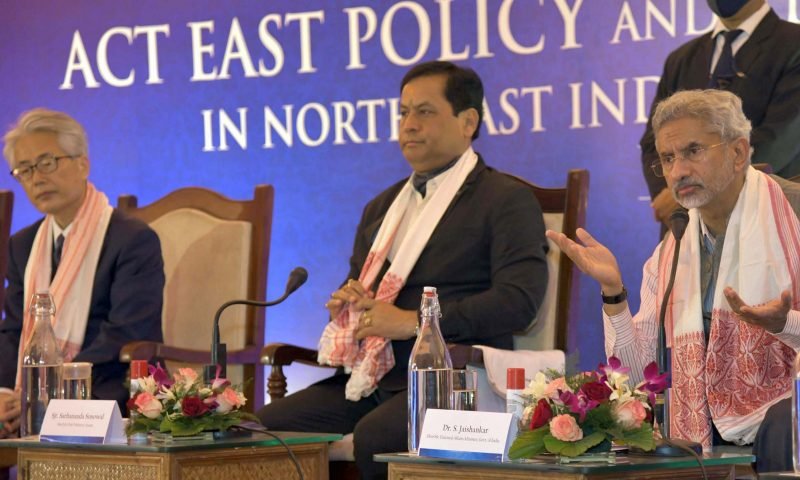The Act East Policy: A commitment towards Assam and India and Japan Relation

External Affairs Minister S. Jaishankar and Japanese Ambassador to India Satoshi Suzuki visited Guwahati, Assam on 15th February 2021 under the pretext of plans for the state along the lines of Modi Government’s ‘Act East Policy’; in action since 2014. The EAM visit to the state marks a new precedent for the India-Japan relations and how this international cooperation could yield future opportunities for Assam and the North-Eastern region at large. EAM Jaishankar stressed that at the heart of the Act East Policy lies the state of Assam, and it is via this state that India will be better able to harness international partnerships beyond Bangladesh and Myanmar and reach South Korea and Japan. To quote the EAM here, “Our presence today not only reflects strong cooperation we have with Japan, but underlines the partnership will benefit India, but Assam in particular.” The statement is indicative of how India could leverage this bilateral relation with Japan for better connectivity with the North Eastern region and beyond.
Remembering the pre-Colonial times, EAM Jaishankar added that Assam had been an integral part of the country as a vast number of trade routes were established through river Brahmaputra. Concerning connectivity in those times, Assam had acted as the bridge between India and South-East Asian region. But colonialism disrupted the prosperity Assam was contributing to India and the state was left behind to carve out its destiny even after independence. However, affirming his faith in the Modi Government, he stressed that things for the state and the North-East region have been drastically changing since 2014. With the world transforming radically, consumption, production, resources and market are invariably affected. EAM Jaishankar commented that despite the rapidity of transformation, India has been able to keep up with its international partners. The challenge that most countries must realize now is how to bend these international partnerships domestically to cater to people, effectively and efficiently.
The visit curates an interesting platform for scholars, analysts and policymakers to realize how India is using its ‘natural alliances’; here Japan gradually implements and execute a massive policy like the Act East Policy. Referring to the past developments brought by the policy, he confirmed that Assam’s connectivity can reach beyond Myanmar and Bangladesh. The connectivity could be stretched up to Vietnam and Japan as well. The optimism of the EAM could be expressed in his own words, “all this will lead to a more connected Assam, more energetic Assam, more contributing Assam and more employed Assam,” he added. Calling upon Japanese Ambassador Satoshi Suzuki’s reference of how India’s automobile sector transformed with the onset of Maruti Suzuki production, EAM Jaishankar vision for Assam and the Act East policy runs through the same dimension.
The added advantage of Assam’s energy conservation, transportation, connectivity requires diplomacy to realize its true potential. However, the EAM added here that Japan’s vision aligns to fit perfectly for the development of Assam and North-East too. Referring to the recent Padma Vibhushan conferred to former Japanese Prime Minister Shinzo Abe, Jaishankar highlighted that it is difficult to find such natural allies in the unstable international world order, and this partnership would be harnessed to bring about glories to the Act East Policy. Stressing on the channels established for waterways, from Assam to Chittagong and Mongla, he envisaged the plan for the state with help from the Japanese to develop similar such channels and port which would connect the Arabian Sea via Assam to the South China Sea. “Ambitious Projects” have been undertaken and Jaishankar thanked the Japanese Ambassador to India for a kind and cordial relation that the two countries have shared this far.
Appreciating the projects that are underway in Assam, EAM Jaishankar mentioned plans that will highlight and amplify the relation between India and Japan. Drawing attention towards the tourism sector of Assam, Jaishankar quoted on how the tourism sector can be revamped with the help of Japanese tourist as well. Further reminding the ‘Dhubri-Phulbari’ Bridge which has a huge contribution from the Japanese, he implied towards various other projects which are underway; South-Central Northern Guwahati District Waterways includes “1183 crores” as a direct loan from Japan. A similar other plan is the Guwahati Sewage Facility and here Jaishankar pronounced, “Japanese loan a nexus again for this project.” Another agreement introduced by the EAM was on the ‘specified skilled’ workers as an internship programme. He also called attention to how the Modi Government has always presented special focus on Assam and the Act East Policy will be a boost for the state.
The positive tone of EAM Jaishankar accentuates not only the relation between India and Japan but also brings a confident future for the state of Assam and the policy at large.



















